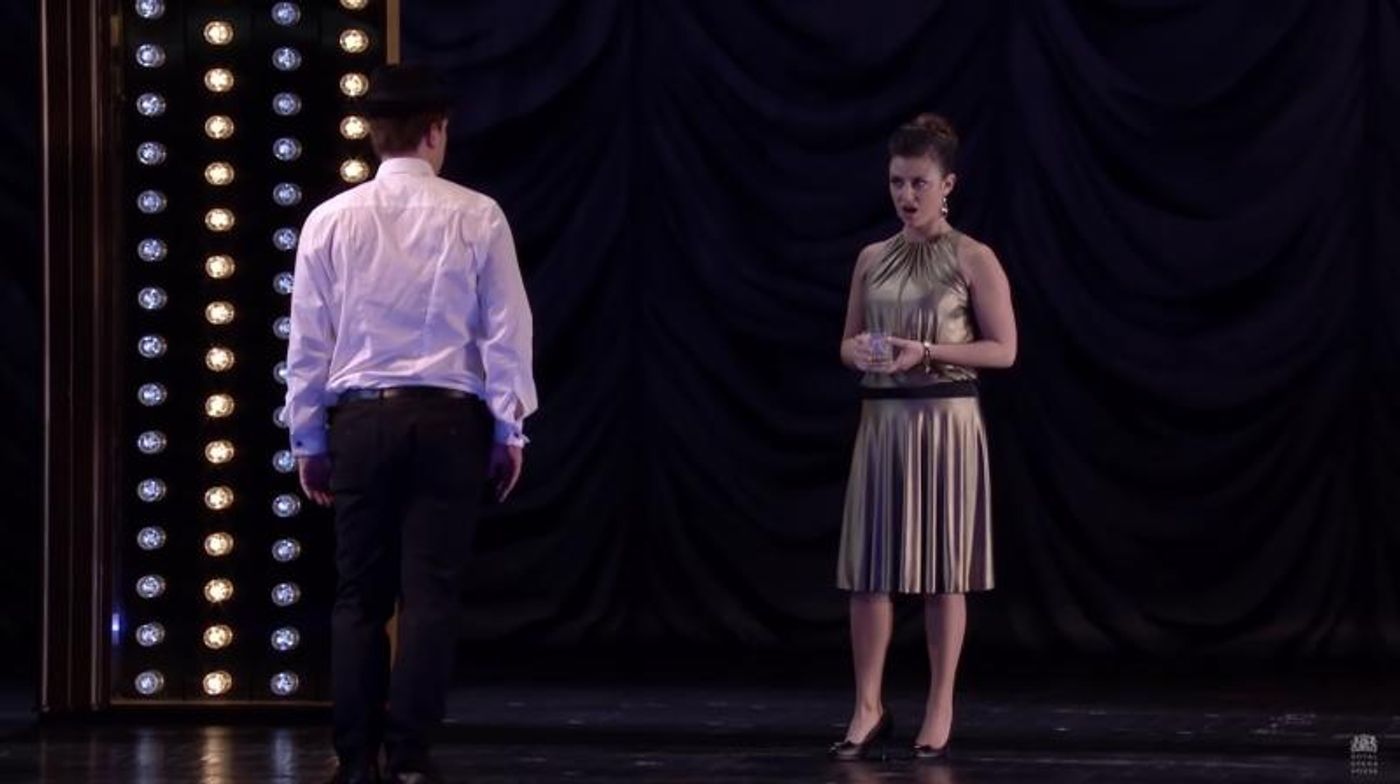Review Roundup: COSI FAN TUTTE at the Royal Opera
 Thomas Allen and five young operatic talents star in Mozart's theatrical and tuneful comedy about love and fidelity, Cosi Fan Tutte at the Royal Opera! Check out the video!
Thomas Allen and five young operatic talents star in Mozart's theatrical and tuneful comedy about love and fidelity, Cosi Fan Tutte at the Royal Opera! Check out the video!
Ferrando and Guglielmo are convinced that their girlfriends Dorabella and Fiordiligi would never be unfaithful. Their friend Don Alfonso doubts this and persuades the men to try an experiment. Ferrando and Guglielmo must pretend to have been called away to war; they will then return in disguise and attempt to seduce their former girlfriends. If they don't succeed within 24 hours, Alfonso will pay them a large sum of money.
Così fan tutte contains some of Mozart's most beautiful arias and attractive ensembles, and is packed with both pathos and humour. German director Jan Philipp Gloger is inspired by Così's alternative title, 'the school for lovers', to set his production in a theatre, with Don Alfonso as an impresario who leads the four lovers on a role-playing journey full of picturesque settings. By the end, everyone has, in Gloger's words, learnt that 'love is not a God-given thing, but something that we have to fight for, find, define, create and dream newly, almost every day'.
Così fan tutte was Mozart's final collaboration with the Italian librettist Lorenzo da Ponte, who based his story on a variety of sources including Greek myths and Renaissance tales. Così was slower to find success than Mozart and Da Ponte's previous collaborations, Le nozze di Figaro and Don Giovanni. Its first run of performances was cut short by the death of Emperor Joseph II, and in the 19th century many viewed its plot as immoral or even cruel. However, since the second half of the 20th century its wonderful music and Mozart and Da Ponte's witty, compassionate examination of young love have ensured its lasting popularity.
Let's see what the critics have to say!
Neil Fisher, The Times: As if making amends for a previous production featuring beige scarfs, chaps in chinos and a few off-white walls, the Royal Opera now has a staging of Mozart's "school for lovers" that's visually exhausting. Here's a pastiche bucolic divertissement in a pastiche baroque theatre, there's a pastiche cocktail bar where you can have an espresso martini. Here's the pastiche Garden of Eden, with a rubber snake. No, wait, now we're going to go on a pastiche film set and it's time to shine a tripod light in the audience's faces.
George Hall, The Stage: Gloger mixes up visual styles and periods, with numerous references to other genres - the scene where Ferrando and Guglielmo are supposedly going off to war has a distinct suggestion of Brief Encounter - but especially to theatre and its artificiality. The result is a clever and entertaining reworking of a familiar but endlessly fascinating comedy.
Michael Church, Independent: All very PC, but the fact is that Mozart and his librettist presented their men and women as equally victimised by circumstances. Moreover, the complex symmetries of the work - sexual, dramatic, and vocal - absolutely don't need the finicky top-dressing Gloger imposes on them. He correctly sees the work as posing questions about the nature of love, but he refuses to let Mozart's brilliantly ironical balance between words and music do its job. The whole of the first act is turned into an exercise in metatheatre, where nobody believes the words they are singing, and where consequently neither do we.
Sophia Lambton, Opera Wire: Other demonstrations of comedic moments scarcely even speak to the humor of "Così fan tutte," seeking simply to emphasize what's funny about them in particular: witnessing them is like watching an endlessly self-deprecating, bitterly struggling stand-up comedian. Despina is no maid, but rather the owner of a bar; for half a second she lifts a black board with the words, "Coca, birra, tutto a €5 ("Coke, beer, everything for €5")." It's funnier when real-life vendors at the Arena di Verona yell it throughout intermissions. Despina is the Queen of Cool; she treats her own bar as a catwalk and prances about. To the rhythm of the music, soprano Serena Gamberoni must rattle Despina's musical cocktail shaker. Charming as the sound of one is, it hardly contends to be another instrument of the orchestra - which it seems to be here for a handful of bars.
Gary Naylor, BroadwayWorld: But the women steal the show - and maybe that's how it should be. Serena Malfi's Dorabella is sexy and never quite submissive, even as she falls for Guglielmo rather more swiftly than Fiordiligi (Salome Jicia, whose voice seems otherworldly at times) eventually, reluctantly, despairingly gives way to Ferrando. Serena Gamberoni is electrifying in every scene as the coquettish, clever Despina - I'd definitely have taken my chances with her back in the day!
Reader Reviews
Videos

